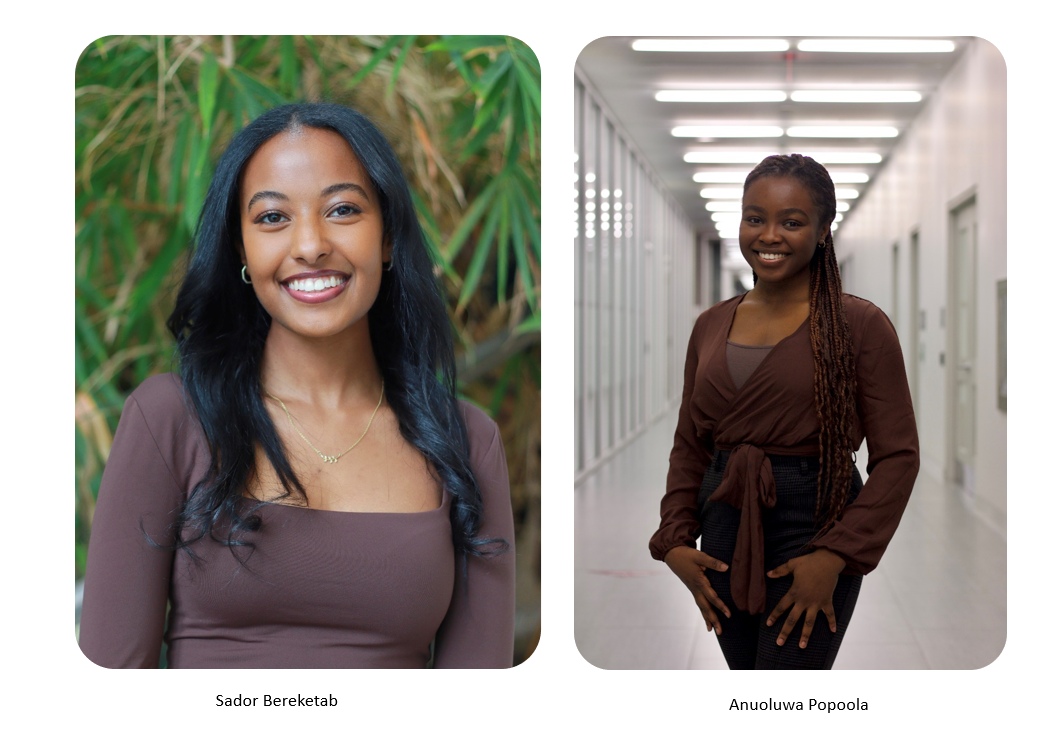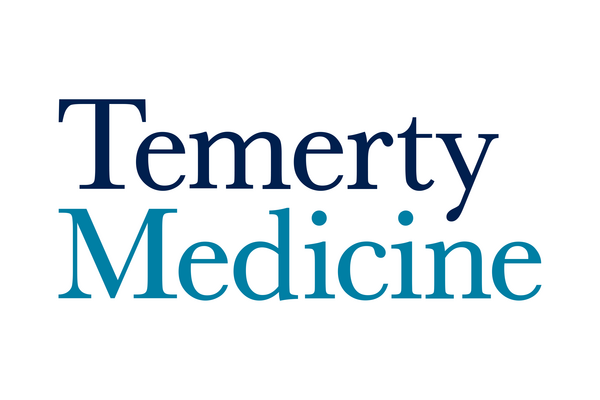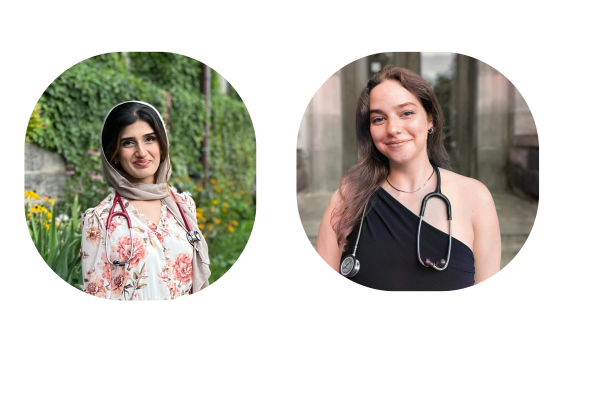Main Second Level Navigation
Meet our BMSA Leadership
Sador and Anu Share Insights from the Application to Admission

Tell us a bit about yourself. What were you pursuing before medical school?
Anu: My name is Anuoluwa, but I go by Anu! Before medical school, I completed an undergraduate degree in Health Sciences with a specialization in Child Health at McMaster University in 2023.
Sador: My name is Sador. Prior to beginning my medical school, I completed my undergraduate studies in Biomedical Sciences at the University of Ottawa in 2023.
What was the application process like for you?
Anu: I found that the application process encouraged me to reflect a lot about my experiences and motivations for pursuing a career in medicine. While this period of time was rather stressful, I also found it to be rewarding. I am also extremely grateful to have had access to resources that helped me at every stage of the process through engaging with the Community of Support (COS). Through COS, I was able to gain access to support while I was writing the MCAT, preparing for CASPER, writing my essays, and during interview preparation season. Having this help alongside support from my family and friends made the process a lot less daunting!
Sador: The medical school application process is in many ways highly convoluted. I found myself feeling a little overwhelmed as I tried to navigate the many steps in the process (i.e. MCAT, CASPER, ABS, Essays, Interviews, etc), all while balancing my other academic, professional and personal commitments. I also found that the application process can feel isolating at times, if not surrounded by others who are currently or have gone through the medical school application process before you. I found that making efforts towards meeting upper year students in my program through clubs and extracurriculars or asking for guidance from my professors and supervisors early on in my undergraduate studies helped me build a support system that later was instrumental in navigating this process. I also made it a priority to stay connected with my family and friends during this time as it helped me stay motivated and grounded during the process!
Can you discuss any mentorship programs or initiatives that BMSA has in place to connect prospective applicants with current medical students or professionals in the field?
Anu: Last year, the BMSA’s Student Outreach team started an initiative called “Yes You Can”. This initiative involved partnering up with three middle schools with diverse student populations in the Toronto District School Board to deliver workshops about pursuing careers in medicine and other allied health professions. Through this initiative, BMSA members and volunteers were able to build mentoring relationships with the students engaged in the program to show them that there is a place for them in healthcare. Building these connections from young is so important and can have major implications on one’s ability to pursue a path in the field of medicine. Last year’s team did a great job leading this initiative, and we hope to build on the amazing work that has been done by our predecessors in this new school year!
We also have a lot of BMSA members collaborate with the Community of Support (COS). COS provides prospective applicants with support at every stage of the admissions process for free in order to help those from disadvantaged backgrounds navigate the admissions process. As a beneficiary of initiatives led by COS, I always encourage students to tap into their resources!
Sador: Anu mentioned a few great support systems for prospective applicants. An additional area of focus for us is how we can support applicants in their transition to medical school. Great there are avenues for application support, but how are you supported once in medical school. This year, our BMSA launched a Buddy Mentorship program where Black first-year medical students are matched with second-year students as early as their first month of medical school. Through these connections, our first-years can lean on someone with similar experiences as them to alleviate some of the initial stressors.
What initiatives or programs have you been involved in or plan to initiate that promote diversity, equity, and inclusion within medical education and the healthcare profession?
Anu: Through hosting town halls and other related events, the BMSA is exposed to diversity, equity, and inclusion concerns experienced by Black medical learners. Collectively, we have worked towards addressing Black health gaps in various aspects of the MD curriculum, some of which include the OBGyn and Respirology units.
Sador: This past year, exposure to Black physicians and Black patient presentations of health conditions was of utmost importance to our Black medical learners. We advocated for increased Black health exposure through a second-year family medicine clinical placement known as FMLE and this year, we are working closely with community health centers to support the mobilization of health resources and knowledge within Black communities across the GTA.
How do you plan to collaborate with other medical student organizations or professional bodies to enhance the support network for Black medical students and aspiring professionals?
Anu: This year, we plan on continuing to collaborate with professional bodies such as the Black Physicians of Ontario (BPAO) and the Black Physicians of Canada (BPC). This will give our members the opportunity to learn from those who came before us and gain access to mentors who may come from similar backgrounds. We understand that it can be quite challenging to find your footing during this journey, especially if you are coming from a marginalized background. That said, we want to ensure that we tap into the wisdom of current Black physicians to help guide us along this path. Last year, many of our members attended the BPC’s inaugural National Conference as well as the BPAO’s Annual Health Symposium. Both of these events gave Black medical learners the opportunity to learn from and network with the wonderful community of Black physicians that exists in Ontario and beyond!
Sador: In addition to the professional bodies that we collaborate with, our BMSA often collaborates with the Black Medical School Association of Canada (BMSAC) and other BMSA chapters across Canada. Through collaborative socials, we have formed a sense of inter-school community amongst Black medical learners, while having the opportunity to create greater impacts through our joint efforts.
What student support services or resources would you recommend that incoming students utilize to ensure successful transition to medical school (e.g., academic advisors, counselors, etc.)?
Anu: There are so many resources that exist for incoming students that will help with their transition to medical school. I found the Office of Learner Affairs to be particularly helpful when I needed support navigating challenges that arose during the school year. It is so easy to book an appointment with one of the many great Learner Life Specialists, so I highly recommend that students who are in need of any kind of support use OLA as a starting point.
Sador: Additionally, there are so many mentorship programs available for students to sign up for at the start of the year, such as the Diversity Mentorship Program (DMP) and the Longitudinal Academic Mentorship Program (LAMP) These programs can help students be connected with mentors in the field who can offer support in navigating their academic journey as well as career planning.
How have you balanced the demanding workload of medical school with your personal well-being and what advice would you give to aspiring applicants on maintaining a healthy work-life balance?
Anu: While the volume of work we have to do in medical school may seem daunting, it is indeed manageable! I have found that prioritizing self-care is a choice that one has to make, otherwise it is very easy to get caught up in all the work that needs to be done and spend all your time studying. I have personally found it helpful to create a schedule for myself that includes time for breaks, socializing, engaging in my hobbies, and fitness, alongside my academic responsibilities. That said, my advice would be to treat everything else in life as you would your academics. In the same way you ensure you block out time to study, block out time for the things that also bring you joy outside of your academics.
Alongside learning, I personally have found a lot of joy in going to the gym, playing my instruments, and painting!
Sador: I agree that medicine can be very demanding and we sometimes find ourselves letting go of other commitments or endeavors. Personally, I have found that my decision to continue pursuing my hobbies hand in hand with medicine helped me stay grounded and ensure that the time I spend studying is both intentional and optimal. In my life, this manifested as reviving a music band with my classmates, continuing my personal pursuits as a singer-songwriter, and making time for my family and friends, when possible. In some ways, I would say that spending your time at the intersection of your interests is a great way of staying motivated and energized since the time you end up devoting to commitments then rarely ends up feeling like work. Don’t let go of hobbies and pastimes when starting medicine!
Reflecting on your journey, what message of encouragement would you like to share with young Black individuals who aspire to become medical professionals?
Anu: Going down the path of pursuing medicine is definitely not easy, but it is so important to ensure that you lean on the people around you when times get tough. Find solace in knowing that you are not alone in this journey, and there are so many of us who are rooting for you. That said, please do not be afraid to seek help when needed. As discussed in our answers above, there are so many avenues for support available to help you in this process. What is meant for you will not pass you by, so keep going!
Sador: I completely second Anu’s points. The decision to pursue medicine can often be tough as we are so rarely used to seeing a diverse set of experiences represented in our profession. But I personally find the application process to be most rewarding when remaining true to your values every step of the way.
Once starting medical school, the same sentiment remains true. Remember your roots and what had brought you into the field to begin with. On behalf of the BMSA, we wish you all the best!
Join us on September 17 to hear more from Anu and Sador at our virtual Let's Chat .
To connect with U of T BMSA
- Instagram: @uoftbmsa
- LinkedIn UofT Black Medical Student Association
- Twitter/X: @uoftbmsa
- Email uoft.bmsa@gmail.com


